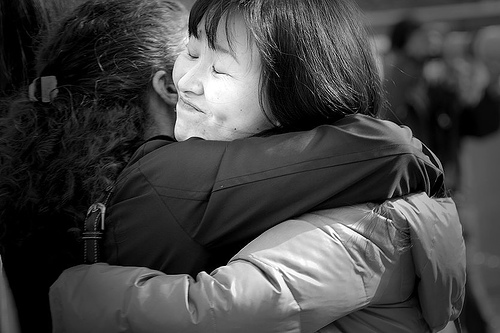How many times have you heard someone say “I feel like such a bad person”? How many times have you thought it secretly to yourself? How often does the tape of ‘I’m not good enough’ and its countless variations play in your mind?
KelseyyBarbara on Flickr
We hear it in so many forms: I’m not pretty enough, not smart enough, not strong enough. I’m never going to get this right. I’m not kind enough, patient enough, loving enough. I will never escape my past. It’s all my fault. I will never be a good enough mother, father, employee, spouse, friend. I’m such a mess, how can anyone put up with me? And so the mental tapes play. And so we become imprisoned by lies of shame.
Shame is focused on the self. It says that we are damaged, we are inadequate, we are less-than. Shame says that other people are perfect and have it together, but we never will. Shame worries over how we would look in others’ eyes if revealed for who we really are. Shame says “I am something wrong. I am a failure.”
This is different from guilt, which focuses on behavior. Guilt says, “I did something wrong. I failed.” Guilt sees the effects of wrongdoing and mistakes and is free to acknowledge where one went wrong.
Think of Adam and Eve in the Garden. Before sin, they were “naked and unashamed”—completely exposed but with no sense of shame to worry over how they measured up or what someone else saw. After sin, shame made its debut, and they covered themselves with fig leaves. Shame made them cover up, shame made them hide, shame made them afraid. Shame kept them from the healthy reaction of guilt, which would have pushed them to confess and say “We’re sorry. We did something wrong.”
Shame, you see, is always in conflict with guilt. Shame focuses on ourselves, keeping us from looking outward at what our behavior has done to others. Shame doesn’t let room for repentance, because it believes that we are failures and it’s the way it is; it will never change.
In her TED talk, Brené Brown discusses the difference between shame and guilt (see link below for the full video). Her research has shown that shame is strongly correlated to addiction, depression, suicide, violence, and eating disorders. Guilt, however, is inversely correlated to these things. In other words, the internal negative focus of shame leads to self-destruction and unhealthy behaviors. Guilt frees us from them.
So, all of those lies of shame—they do nothing to make us better people; they do nothing to help us improve our behavior. Shame does nothing to bring us to confession and repentance. Shame does nothing to bring about godliness. If I can go so far, shame is not the voice of God—it’s the voice of the enemy, the accuser, the destroyer who seeks to “kill, steal, and destroy.”
Brown goes on to say this: “If you put shame in a Petri dish, it needs three things to grow exponentially: secrecy, silence, and judgment. If you put the same amount of shame in a Petri dish and douse it with empathy, it can’t survive.”
This should deeply affect the way we respond to other people. When they come with struggles and sins, either obvious or hidden, in plain sight or subtle, confessed and repented or not—how can we avoid shaming them, knowing that it is godly guilt, sparked by the Holy Spirit, that will lead us to repentance? A shame-culture leads people to hide their sins and struggles, afraid of what people will think or say if they come to light. A shaming-voice tries to play the convicting role of the Holy Spirit by reminding the person how bad they are and how bad their action was. (Let me just say here that the Holy Spirit is really good at his job and most certainly does not need us to fill in for him.) A shaming-voice is finger-pointing, saying “look at them,” instead of a compassionate embrace saying “me too.”
This does not mean that we dismiss sin and its gravity. It does mean that our role is to be compassionate and kind, following in the footsteps of our Lord Jesus. It does mean that we must show acceptance even before repentance. Think of the so-called “sinners” that Jesus spent time with during his earthly ministry. He does not seem to have demanded they clean up their act before he would come to their house for dinner. He did not keep them at arm’s length until they reformed, afraid that he’d give them the wrong idea and they would keep on sinning. Instead, it was through Jesus’ kindness, compassion, and acceptance that they changed their ways; it was after coming into Jesus’ presence that their lives were transformed.
Think of the woman caught in adultery—everyone else was ready to kill her; they made her an exhibit of shame—but Jesus calmly wrote in the sand. He didn’t feel the need to say, ‘yes, look at this sinful woman.’ He did not condemn her. When Jesus said that the one without sin could throw the first stone, the self-righteous religious leaders of that day at least had the sense to drop their stones and walk away. I wonder if many of us today would have the same sense.
What people need is not shame. It’s not condemnation. And it’s not a human-Holy Spirit. What people need—and if we’re being honest, what all of us need—is to be brought to meet Jesus—and often that’s through his human representatives—the church. What people need is compassion.


